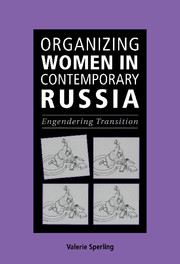Book contents
- Frontmatter
- Contents
- List of tables
- Acknowledgments
- Note on transliteration
- Map
- Introduction
- 1 Russian women's movement groups and activists
- 2 Analyzing social movements
- 3 Feminism, femininity, and sexism: socio-cultural opportunities and obstacles to women's movement organizing
- 4 “Democracy without women is not democracy!”: political opportunities and obstacles to women's movement organizing
- 5 “Unemployment has a woman's face…”: economic opportunities and obstacles to women's movement organizing
- 6 Remembrance of things past: the impact of political history on women's movement organizing
- 7 International influences on the Russian women's movement
- Conclusion
- Appendix
- Selected bibliography
- Index
6 - Remembrance of things past: the impact of political history on women's movement organizing
Published online by Cambridge University Press: 22 September 2009
- Frontmatter
- Contents
- List of tables
- Acknowledgments
- Note on transliteration
- Map
- Introduction
- 1 Russian women's movement groups and activists
- 2 Analyzing social movements
- 3 Feminism, femininity, and sexism: socio-cultural opportunities and obstacles to women's movement organizing
- 4 “Democracy without women is not democracy!”: political opportunities and obstacles to women's movement organizing
- 5 “Unemployment has a woman's face…”: economic opportunities and obstacles to women's movement organizing
- 6 Remembrance of things past: the impact of political history on women's movement organizing
- 7 International influences on the Russian women's movement
- Conclusion
- Appendix
- Selected bibliography
- Index
Summary
The functioning of social movements in Russia is not a norm of cultural and political life.
Decades of Soviet rule have shaped the opportunities available to the Russian women's movement in important ways. In the economic realm, because all social organizations under the Soviet regime had been controlled and supported by the state, women's groups emerging in recent years have lacked an economic infrastructure that could support grassroots organizing and fundraising. The general absence of civil society under Soviet rule has similarly constrained the contemporary women's movement's ability to network and expand along associational lines. As one scholar writing about movement organizing in Eastern Europe succinctly observed, “block recruitment of viable communities and associations does not operate when there are no blocks to recruit.” The Soviet socio-cultural legacy has also created obstacles to women's movement mobilization; these are embodied in a well-entrenched set of social attitudes about women's roles and rights, shaped by the Bolsheviks' antifeminist ideology. In the political sphere, the history of Soviet rule preceding the transition period has had a significant impact on the dynamics between women's movement groups, and on their organizational structures and tactics. Political history, the construct I use to describe the process through which this impact occurs, forms the subject of this chapter.
Political history can be divided into three elements: the history and legacy of political institutions in a given country; the cycles of protest that have arisen in that country; and the “defining political events” of that country's history.
- Type
- Chapter
- Information
- Organizing Women in Contemporary RussiaEngendering Transition, pp. 179 - 219Publisher: Cambridge University PressPrint publication year: 1999



